全国公共英语三级共100页
- 格式:ppt
- 大小:9.86 MB
- 文档页数:100
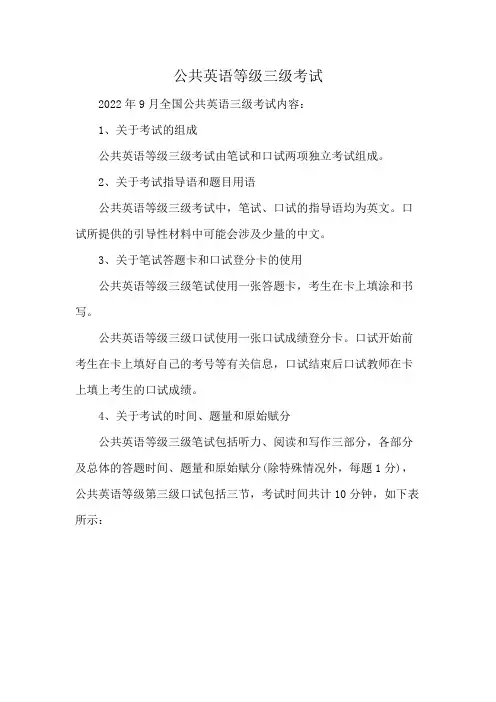
公共英语等级三级考试
2022年9月全国公共英语三级考试内容:
1、关于考试的组成
公共英语等级三级考试由笔试和口试两项独立考试组成。
2、关于考试指导语和题目用语
公共英语等级三级考试中,笔试、口试的指导语均为英文。
口试所提供的引导性材料中可能会涉及少量的中文。
3、关于笔试答题卡和口试登分卡的使用
公共英语等级三级笔试使用一张答题卡,考生在卡上填涂和书写。
公共英语等级三级口试使用一张口试成绩登分卡。
口试开始前考生在卡上填好自己的考号等有关信息,口试结束后口试教师在卡上填上考生的口试成绩。
4、关于考试的时间、题量和原始赋分
公共英语等级三级笔试包括听力、阅读和写作三部分,各部分及总体的答题时间、题量和原始赋分(除特殊情况外,每题1分),公共英语等级第三级口试包括三节,考试时间共计10分钟,如下表所示:
5、关于笔试分数权重
为处理好考试中题目数量、赋分与各种技能的考查关系,公共英语等级三级笔试采用了分数加权的办法,即对各部分题目的原始赋分分别给予不同的权重,使之能够平衡各种技能的考查关系。
公共英语等级第三级笔试中各部分所占分数权重如下所示:
6、关于合格成绩
公共英语等级三级笔试成绩是笔试各部分原始得分加权后的总和,满分100分,60分以上(含60分)为合格。
公共英语等级三级口试成绩是两名口试教师所给分数加权后的总和,满分5分,3分以上(含3分)为合格。
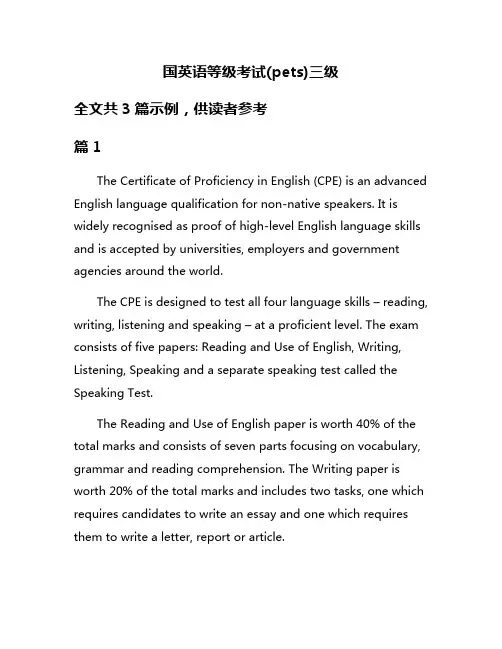
国英语等级考试(pets)三级全文共3篇示例,供读者参考篇1The Certificate of Proficiency in English (CPE) is an advanced English language qualification for non-native speakers. It is widely recognised as proof of high-level English language skills and is accepted by universities, employers and government agencies around the world.The CPE is designed to test all four language skills – reading, writing, listening and speaking – at a proficient level. The exam consists of five papers: Reading and Use of English, Writing, Listening, Speaking and a separate speaking test called the Speaking Test.The Reading and Use of English paper is worth 40% of the total marks and consists of seven parts focusing on vocabulary, grammar and reading comprehension. The Writing paper is worth 20% of the total marks and includes two tasks, one which requires candidates to write an essay and one which requires them to write a letter, report or article.The Listening paper is worth 20% of the total marks and consists of four parts, with a variety of listening tasks including multiple choice, matching and gap-fill exercises. The Speaking Test is worth 20% of the total marks and consists of four parts which assess the candidate’s ability to speak fluently and coherently on a range of topics.To pass the CPE, candidates must achieve a minimum overall score of 200 out of a possible 230 marks. This corresponds to a Grade A, which is awarded to candidates who demonstrate a high level of proficiency in English.Overall, the CPE is a challenging but rewarding exam that provides candidates with a globally-recognised qualification in English language proficiency. It is suitable for those who wish to study or work in an English-speaking environment and is a valuable asset for anyone seeking to improve their English skills.篇2The Preliminary English Test (PET) is an intermediate level exam designed for students who have reached a good level of English and want to demonstrate their ability to use the language in practical situations. The PET is set at Level B1 of the Common European Framework of Reference for Languages(CEFR), which means that candidates should be able to communicate effectively in a variety of common situations.The PET exam assesses the four main language skills: listening, reading, writing, and speaking. The exam is divided into four sections, each testing a different skill. In the listening section, candidates listen to a series of recordings and answer multiple choice questions. The reading section requires candidates to read a variety of texts and answer comprehension questions. The writing section asks candidates to write an email, letter, or report of around 100 words. The speaking section involves a face-to-face interview with an examiner, where candidates discuss a range of topics and complete a shortrole-play task.To prepare for the PET exam, candidates are advised to practice their English skills regularly in a variety of contexts. This could involve reading newspapers, magazines, and books in English, watching English-language TV shows and films, and listening to English radio stations and podcasts. Candidates should also try to communicate in English as much as possible, whether through conversations with native speakers, online language exchanges, or language classes.There are a number of resources available to help candidates prepare for the PET exam, including textbooks, online practice tests, and exam preparation courses. These resources can provide candidates with useful tips and strategies for each section of the exam, as well as practice materials to help them improve their English skills.Taking the PET exam can be a valuable experience for students who want to improve their English skills and demonstrate their proficiency to employers or universities. Achieving a good score on the exam can open up a wide range of opportunities for further study and career advancement. By preparing thoroughly and approaching the exam with confidence, candidates can increase their chances of success and achieve their language learning goals.篇3The Preliminary English Test (PET) is an intermediate level qualification in English that is offered by Cambridge English Language Assessment. It is designed to assess the student's ability to communicate effectively in everyday situations.The PET exam is divided into four sections: Reading, Writing, Listening, and Speaking. Each section has its own range of tasksand question types, and the exam is designed to test a wide range of language skills.The Reading section consists of four parts that test the student's ability to read and understand a variety of written texts, including notices, signs, and messages. Students are required to answer different types of questions, such as multiple-choice, matching, and true/false/not given questions.The Writing section also consists of four parts, including writing a short message, a letter, and an essay. In this section, students are required to demonstrate their ability to write clearly and cohesively on a variety of topics.The Listening section consists of four parts, including listening to conversations, announcements, and monologues. Students are required to answer different types of questions, such as multiple-choice, matching, and completion questions based on what they hear.The Speaking section consists of four parts where students are required to participate in a conversation, describe a photograph, and engage in a discussion with the examiner on a given topic. This section is designed to test the student's ability to speak fluently and accurately.Overall, the PET exam is a comprehensive test of the student's ability to use English in everyday situations. By passing the PET exam, students can demonstrate that they have a good foundation in English and can communicate effectively in both social and professional contexts. It is a valuable qualification for those who are looking to improve their English language skills and advance their careers.。
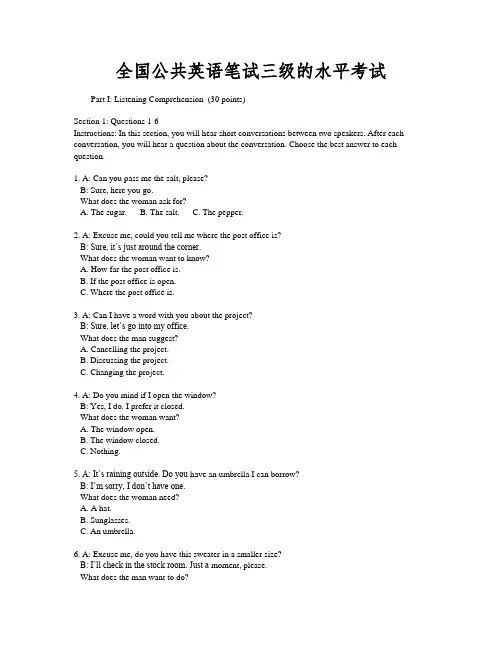
全国公共英语笔试三级的水平考试Part I: Listening Comprehension (30 points)Section 1: Questions 1-6Instructions: In this section, you will hear short conversations between two speakers. After each conversation, you will hear a question about the conversation. Choose the best answer to each question.1. A: Can you pass me the salt, please?B: Sure, here you go.What does the woman ask for?A. The sugar.B. The salt.C. The pepper.2. A: Excuse me, could you tell me where the post office is?B: Sure, it’s just around the corner.What does the woman want to know?A. How far the post office is.B. If the post office is open.C. Where the post office is.3. A: Can I have a word with you about the project?B: Sure, let’s go into my office.What does the man suggest?A. Cancelling the project.B. Discussing the project.C. Changing the project.4. A: Do you mind if I open the window?B: Yes, I do. I prefer it closed.What does the woman want?A. The window open.B. The window closed.C. Nothing.5. A: It’s raining outside. Do you have an umbrella I can borrow?B: I’m sorry, I don’t have one.What does the woman need?A. A hat.B. Sunglasses.C. An umbrella.6. A: Excuse me, do you have this sweater in a smaller size?B: I’ll check in the stock room. Just a moment, please.What does the man want to do?A. Buy a sweater.B. Exchange a sweater for a smaller size.C. Check the stock room.Section 2: Questions 7-11Instructions: In this section, you will hear short talks or dialogues. After each one, you will hear a question about it. Choose the best answer to each question.7. Customer: I’d like to book a table for two at your restaurant tonight.Receptionist: I’m sorry, we’re fully booked.What does the customer want to do?A. Reserve a table for two tonight.B. Change an existing reservation.C. Cancel a reservation.8. Announcement: Ladies and gentlemen, please remember to keep your mobile phones switched off during the flight.What should the passengers do?A. Keep their mobile phones switched on.B. Keep their mobile phones switched off.C. Use their mobile phones only when necessary.9. Man: Excuse me, could you help me find the nearest metro station?Woman: Yes, certainly. Just take a left at t he end of the road and it’s two blocks away on your right. What does the woman do?A. Gives directions.B. Asks for help.C. Looks for a metro station.10. Man: Do you know if there’s a bank nearby?Woman: Yes, there’s a bank just ac ross the street.What does the man want to find?A. A hotel.B. A bank.C. A restaurant.11. Man: Excuse me, what time does the concert start?Woman: It starts at 7 pm sharp.What does the man want to know?A. When the concert ends.B. Where the concert is.C. When the concert starts.Section 3: Questions 12-15Instructions: In this section, you will hear an interview or a monologue. After each one, you will hear some questions about it. Choose the best answer to each question.12. Interviewer: What do you consider to be the most important qualities for a good teacher?Guest: Patience, creativity, and the ability to communicate effectively.What qualities does the guest mention?A. Patience and creativity.B. Creativity and the ability to communicate effectively.C. Patience, creativity, and communication skills.13. Speaker: Before you go on a long journey, it’s essential to make sure your car is in good condition. Firstly, check the tires for any signs of wear and tear.What does the speaker suggest doing before a long journey?A. Checking the tires.B. Filling up the tank.C. Cleaning the car.14. Speaker: One of the most memorable experiences I’ve ever had was going on a wildlife safari in Africa. I saw lions, elephants, and zebras up close.What does the speaker talk about?A. A trip to Africa.B. Animals in Africa.C. Memorable experiences.15. Speaker: The future of technology looks promising. Advancements in artificial intelligence will revolutionize many industries.What is the speaker discussing?A. The future of technology.B. Artificial intelligence.C. Revolutionary industries.Part II: Reading Comprehension (40 points)Section 1: Questions 16-20 (10 points)Instructions: In this section, you will read a short passage. Afterward, answer the questions that follow. Passage:Every year, thousands of people flock to the beautiful town of San Miguel de Allende in Mexico for its annual festival known as Guelaguetza, or “Lienzo de Charro”. This cultural event celebrates the local traditions, crafts, and music that have been passed down from generation to generation. During the festival, visitors have the opportunity to experience the vibrant Mexican culture through traditional dances, colorful parades, and lively music performances. Artisans from different regions gather in San Miguel de Allende to showcase their crafts, including pottery, textiles, and leatherwork. There are also various food stalls where visitors can sample delicious traditional Mexican dishes. Guelaguetza is a must-visit event for those who want to immerse themselves in Mexican traditions and experience the warm hospitality of the local community.16. Why do people visit San Miguel de Allende?A. To attend the Guelaguetza festival.B. To visit the local markets.C. To enjoy the beaches.17. What does the Guelaguetza festival celebrate?A. Mexican traditions, crafts, and music.B. Dances, parades, and music.C. Pottery, textiles, and leatherwork.18. What can visitors do during the festival?A. Experience traditional dances and music.B. Sample different traditional dishes.C. Both A and B.19. Who participates in the Guelaguetza festival?A. Artisans from different regions.B. Tourists from all over the world.C. Local residents.20. What is the main purpose of the Guelaguetza festival?A. To showcase Mexican crafts.B. To promote the local economy.C. To celebrate Mexican traditions and culture.Section 2: Questions 21-25 (10 points)Instructions: In this section, you will read a short passage. Afterward, answer the questions that follow. Passage:Did you know that reading books can have a positive effect on your mental health? Studies have shown that reading can help reduce stress levels, improve cognitive function, and even slow down memory decline. When we read, our brain is engaged in a way that activates different regions, allowing us to imagine and have a deeper understanding of the story. This mental exercise strengthens our brain connections and improves overall brain health. Additionally, reading can also provide an escape from the demands and pressures of everyday life. It allows us to relax and take a break from our own thoughts and worries. Whether it’s fiction, nonfiction, or self-help books, reading offers a form of entertainment, education, and therapy for the mind.21. What positive effect can reading books have on mental health?A. Reducing stress levels.B. Improving cognitive function.C. Both A and B.22. How does reading activate the brain?A. By strengthening brain connections.B. By reducing memory decline.C. By improving overall brain health.23. What can reading provide in terms of escape?A. An opportunity to relax.B. A break from everyday life.C. Both A and B.24. Which types of books are mentioned in the passage?A. Fiction, nonfiction, and self-help books.B. Textbooks and reference books.C. Science fiction and romance novels.25. What does the passage suggest about reading?A. It is a form of entertainment and education.B. It is a waste of time.C. It is only beneficial for academic purposes.Section 3: Questions 26-30 (10 points)Instructions: In this section, you will read two short dialogues. Afterward, answer the questions that follow.Dialogue 1:Kate: Are you planning to go to the concert next week?Michael: Yeah, I heard it’s going to be amazing. I already bought the tickets.Kate: That’s great! I’ve been looking forward to it for weeks.26. What are they talking about?A. A concert.B. A movie.C. A play.27. Where did Michael buy the tickets?A. At the concert venue.B. Online.C. At a ticket booth.Dialogue 2:Emma: Do you know where the nearest library is?David: Yes, it’s just two blocks away from here. You can’t miss i t.Emma: Thank you!28. What is Emma looking for?A. A library.B. A bookstore.C. A restaurant.29. How far is the library from their location?A. One block away.B. Two blocks away.C. Three blocks away.30. How does David think Emma will find the library?A. Easily.B. With some difficulty.C. Just follow the crowd.Part III: Grammar and Vocabulary (30 points)Section 1: Questions 31-35 (10 points)Instructions: Each sentence contains a blank. Choose the best word or phrase to fill in the blank.31. I don’t __________ playing tennis since I hurt my wrist.A. enjoyB. have enjoyedC. enjoy to32. Can you please turn __________ the volume? It’s too loud.A. upB. onC. down33. I’m sorry I can’t attend your party tonight. I __________ an important appointment.A. haveB. will haveC. had34. My grandparents have been __________ for 50 years.A. marriedB. marryC. marrying35. The weather __________ terrible, so we decided to stay at home.A. wasB. wereC. areSection 2: Questions 36-40 (10 points)Instructions: Each sentence contains a word or phrase in brackets. Choose the best word or phrase to complete the sentence.36. I love __________ (to dance / dancing) in my free time.37. My sister __________ (can’t cook / can’t cooking) very well.38. I enjoy listening to music, __________ (especially / except) classical music.39. They __________ (have have / have had) a great vacation last month.40. I’ll be home in 10 minutes. __________ (Do you want / Will you want) me to bring anything? Section 3: Questions 41-45 (10 points)Instructions: Each sentence has four underlined items marked A, B, C, and D. Choose the one underlined part that needs to be corrected.41. I am too tired (A) for go (B) to the (C) gym (D) today.42. What time (A) do your (B) train leaves (C) tomorrow (D)?43. (A) Rome is (B) the capital of (C) Italy, that (D) is a beautiful country.44. How many (A) students (B) is (C) there (D) in your class?45. She plays (A) the guitar (B) good (C) than (D) her brother.Part IV: Writing (30 points)Instructions: Write a composition of at least 120 words on the following topic.Topic: Describe your favorite hobby and explain why you enjoy it.I enjoy hiking in the mountains. Hiking allows me to escape from the hustle and bustle of city life and connect with nature. There is something magical about being surrounded by trees, the sound of birds singing, and the fresh mountain air. When I hike, I feel a sense of freedom and tranquility that is hard to find elsewhere.Moreover, hiking is not only about the physical exercise, but also about discovering new places. I have had the opportunity to explore breathtaking landscapes, hidden waterfalls, and picturesque viewpoints. Each hike is a new adventure, and I love the feeling of anticipation before reaching the summit or discovering a hidden gem along the way.Hiking also allows me to challenge myself mentally and physically. It pushes me to overcome obstacles, improves my endurance, and boosts my self-confidence. The feeling of accomplishment when I reach the top of a mountain is indescribable.Overall, hiking is my favorite hobby because it combines exercise, exploration, and a sense of inner peace. It rejuvenates my mind and body, and I always come back from a hike feeling refreshed and inspired.(Word count: 163 words)。

公共英语等级考试三级
公共英语等级考试三级是一个国际通用的英语水平考试,其主要考察英语基本语法、单词、阅读理解、口语表达以及听力等方面的能力。
此考试通常分为听力、阅读、口语和写作四个部分,其中考试难度逐渐增加。
达到三级的考生,能够运用基本的英语句式和词汇进行日常对话,熟练阅读简单的报纸、杂志等材料,掌握基本书信写作技巧,同时能够听懂和表达日常生活中的一些简单交流内容。
公共英语等级考试三级在国际上被广泛认可,是出国留学和工作的基本英语水平要求之一。
通过该等级考试,考生可以证明自己具有一定的英语能力,有助于在国际交流中更加自信地表达自己的意思,同时提升个人的英语学习水平和竞争力。
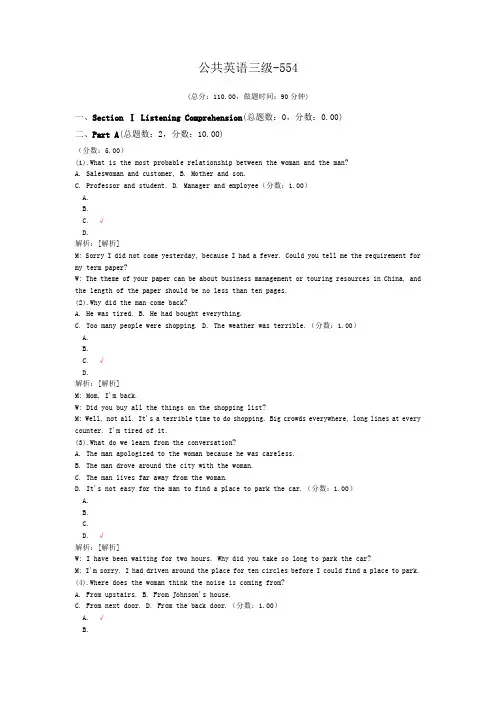
公共英语三级-554(总分:110.00,做题时间:90分钟)一、Section Ⅰ Listening Comprehension(总题数:0,分数:0.00)二、Part A(总题数:2,分数:10.00)(分数:5.00)(1).What is the most probable relationship between the woman and the man?A. Saleswoman and customer,B. Mother and son.C. Professor and student.D. Manager and employee(分数:1.00)A.B.C. √D.解析:[解析]M: Sorry I did not come yesterday, because I had a fever. Could you tell me the requirement for my term paper?W: The theme of your paper can be about business management or touring resources in China, and the length of the paper should be no less than ten pages.(2).Why did the man come back?A. He was tired.B. He had bought everything.C. Too many people were shopping.D. The weather was terrible.(分数:1.00)A.B.C. √D.解析:[解析]M: Mom, I'm back.W: Did you buy all the things on the shopping list?M: Well, not all. It's a terrible time to do shopping. Big crowds everywhere, long lines at every counter. I'm tired of it.(3).What do we learn from the conversation?A. The man apologized to the woman because he was careless.B. The man drove around the city with the woman.C. The man lives far away from the woman.D. It's not easy for the man to find a place to park the car.(分数:1.00)A.B.C.D. √解析:[解析]W: I have been waiting for two hours. Why did you take so long to park the car?M: I'm sorry. I had driven around the place for ten circles before I could find a place to park.(4).Where does the woman think the noise is coming from?A. From upstairs.B. From Johnson's house.C. From next door.D. From the back door.(分数:1.00)A. √B.C.D.解析:[解析]M: What's all that noise? It sounds as if it's coming from next door. The Johnsons aren't back yet, are they?W: I don't think so. It must be the window-cleaner working upstairs.(5).Why can't the woman go with the man?A. She's a little tired.B. She's going to go to the library.C. She wants to listen to music.D. She's going to study.(分数:1.00)A.B. √C.D.解析:[解析]M: I'm a little tired, so I think I'll go to the student restroom and listen to music. Would you go with me?W: I'd love to. But I have to go to the library to look at a book on reserve.(分数:5.00)(1).How much will the man pay?A. $25.B. $50.C. $20.D. $40.(分数:1.00)A. √B.C.D.解析:[解析]M: How much are the tickets?W: They're ten dollars each for the general public, but student tickets are half price.M: All the five of us are students.(2).Which dress did the woman wear?A. The prettier one.B. The one that the man likes.C. The new one.D. The more comfortable one.(分数:1.00)A.B.C.D. √解析:[解析]M: I was hoping that you'd wear your new dress. It's much prettier.W: But this one is more. comfortable for hot weather.(3).Where is George now.?A. Here.B. Europe.C. Canada.D. California.(分数:1.00)A.B.C. √D.解析:[解析]M: Why are you in a hurry?W: We're preparing to go for a picnic tomorrow. I want to buy something in the supermarket.M: So George has returned from Europe?W: Yes, but he was only here for three days before his company sent him to Canada.(4).How does the woman feel about the exam?A. She feels great.B. She feels terrible.C. She feels proud.D. She feels satisfied.(分数:1.00)A.B. √C.D.解析:[解析]M: What did you think of the final exam?W: At the end of the first hour I was still on the first page. I could hardly finish the paper.(5).What do we learn from the conversation?A. The woman likes everything except going shopping.B. The woman likes nothing as a matter of fact.C. The woman likes many things as a matter of fact.D. The woman's best hobby is dancing.(分数:1.00)A.B.C. √D.解析:[解析]M: What's your hobby?W: I like many things, such as dancing, singing, music and so on. But I like nothing better than to go shopping.三、Part B(总题数:4,分数:15.00)(分数:3.00)(1).How old is Katie?A. 16.B. 17.C. 18.D. 19.(分数:1.00)A.B.C. √D.解析:[解析]M: Come in. Please have a seat.W: Thank you.M: I'm Paul Turner. Branch Manager.W: Katie Thomas, nice to meet you.M: I hear that you're looking for temporary office work.W: That's right.M: How old are you, Katie?W: Eighteen.M: That's rather young. What experience have you had?W: Well, I've just left school, in fact, and I'm looking for a job between now and when I go to college.M: It doesn't sound as if we can help, Katie. You see, our clients are very demanding, especially when it comes to new office technology.W: Oh, that's no problem. I took extra classes in office skills at school.M: Oh, perhaps you'd like to outline what you've been doing?W: I started by learning keyboard skills. Then I went on to learn about word processing.M: Good. You seem qualified from the technical point of view. But how well do you think you'll get along with people in an office?W: I think I'm quite adaptable. I belonged to the drama society, as well as working on the school magazine. And I played a bit of sports. So I'm used to working as part of a team.M: Sounds good. Let's see…There's a request from Johnson's Imports for "a bright youngster…".(2).What kind of job is Katie looking for?A. A part-timer job for a school magazine.B. A full-time job at a college.C. A permanent job at Johnson's Imports.D. A short-term job in an office.(分数:1.00)A.B.C.D. √解析:(3).What qualifications does Katie have for the job?A. Her extra classes in sport at school.B. She has computer skills and used to working with people.C. She's adaptable.D. Her work experience in the school newspaper.(分数:1.00)A.B. √C.D.解析:(分数:4.00)(1).How does David go back home from the store?A. On foot.B. By bike.C. By car.D. Jane offers him a lift.(分数:1.00)A. √B.C.D.解析:[解析]W: David, can I give you a hand with one of those grocery bags?M: Sure, Jane. Could you take this one please? I didn't realize how heavy these bags would be. W: Why did you buy so much stuff when you had to walk back home from the store?M: Well, I didn't intend to buy a lot. But I'm having some people over and I guess I needed more than I expected.W: What's the occasion?M: Now the people I live with, the Kremers, have been on vacation for a month and I thought I'd surprise them. I'm inviting some of their friends and families for a welcome home dinner. W: Oh, that's really thoughtful of you.M: I figure it's the least I can do for them. I've been staying with them rent-free while I'm in school.W: Really? That's pretty generous of them.M: Well, they must understand how difficult it is to make ends meet when you're a student. They've been such a big help to me. I thought that this might be a small way to thank them for the generosity.(2).Why did David go to the store?A. Because he wanted to buy some bags.B. Because he wanted to buy some grocery for a dinner.C. Because he wanted to meet with the Jane.D. Because he wanted to buy the Kremers some gifts.(分数:1.00)A.B. √C.D.解析:(3).What can we learn about the Kremers from the dialogue?A. They are coming home from a vacation.B. They are David's relatives.C. They asked David to prepare dinner before they arrived at home.D. They rent a room to David in their house.(分数:1.00)A. √B.C.D.解析:(4).What do we know about David?A. He is working in a school.B. He is grateful to the Kremers.C. He has little money and can't afford to pay the house rent.D. He is inviting some of his friends to the dinner.(分数:1.00)A.B. √C.D.解析:(分数:4.00)(1).What is the characteristic of learners of special English?A. They want to change the way English is taught.B. They want to have an up-to-date knowledge of English.C. They know clearly what they want to learn.D. They learn English to find well-paid jobs.(分数:1.00)A.B.C. √D.解析:[解析]There are three groups of English learners: beginners, intermediate learners, and learners of special English. Beginners need to learn the basics of English. Students who have reached an intermediate level benefit from learning general English skills. But what about students who want to learn special English for their work or professional life? Most students, who fit into this third group have a clear idea about what they want to learn. A bank clerk, for example, wants to use this special vocabulary and technical terms of finance. But for teachers, deciding howto teach special English is not always so easy. For a start, the variety is enormous. Every field from airline pilots to secretaries has its own vocabulary and technical terms. Teachers also need to have an up-to-date knowledge of that specialized language, and not many teachers are exposed to working environments outside the classroom. These issues have influenced the way special English is taught in schools. This type of course is usually known as English for Specific Purposes, or ESP and there is an ESP course in almost every area of professional and working life. In Britain, for example, there are courses which teach English for doctors, lawyers, reporters, travel agents and people working in the hotel industry. By far, the most popular ESP courses are for business English.[解析] 根据...have a clear idea about what they want to learn.因此选C。
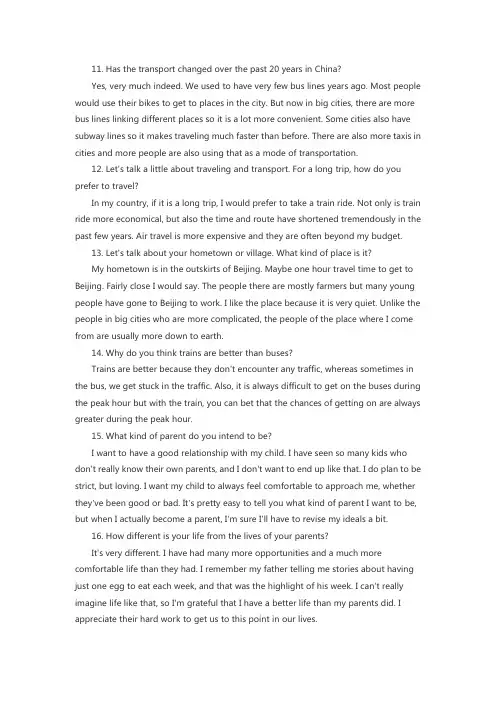
11. Has the transport changed over the past 20 years in China?Yes, very much indeed. We used to have very few bus lines years ago. Most people would use their bikes to get to places in the city. But now in big cities, there are more bus lines linking different places so it is a lot more convenient. Some cities also have subway lines so it makes traveling much faster than before. There are also more taxis in cities and more people are also using that as a mode of transportation.12. Let's talk a little about traveling and transport. For a long trip, how do you prefer to travel?In my country, if it is a long trip, I would prefer to take a train ride. Not only is train ride more economical, but also the time and route have shortened tremendously in the past few years. Air travel is more expensive and they are often beyond my budget.13. Let's talk about your hometown or village. What kind of place is it?My hometown is in the outskirts of Beijing. Maybe one hour travel time to get to Beijing. Fairly close I would say. The people there are mostly farmers but many young people have gone to Beijing to work. I like the place because it is very quiet. Unlike the people in big cities who are more complicated, the people of the place where I come from are usually more down to earth.14. Why do you think trains are better than buses?Trains are better because they don't encounter any traffic, whereas sometimes in the bus, we get stuck in the traffic. Also, it is always difficult to get on the buses during the peak hour but with the train, you can bet that the chances of getting on are always greater during the peak hour.15. What kind of parent do you intend to be?I want to have a good relationship with my child. I have seen so many kids who don't really know their own parents, and I don't want to end up like that. I do plan to be strict, but loving. I want my child to always feel comfortable to approach me, whether they've been good or bad. It's pretty easy to tell you what kind of parent I want to be, but when I actually become a parent, I'm sure I'll have to revise my ideals a bit.16. How different is your life from the lives of your parents?It's very different. I have had many more opportunities and a much more comfortable life than they had. I remember my father telling me stories about having just one egg to eat each week, and that was the highlight of his week. I can't really imagine life like that, so I'm grateful that I have a better life than my parents did. I appreciate their hard work to get us to this point in our lives.17. Who does most of the shopping in your family?Well, I do most of the grocery shopping because there's a market very close to my work. It's very convenient for me to pick up milk or eggs or what ever on my way home from work. But, my wife also enjoys shopping very much. She usually does a lot of the clothes shopping for my son and me.18. Are you a good cook?a. Yes. I learned everything from my mother who was really famous in our hometown for her cooking. I suppose she learned how to cook from her mother as well.I think that's how I won my husband's heart, by being such a good cook. He really appreciates good food, and I enjoy cooking for him.b. No. I'm a terrible cook. No one has ever taught me how to cook. I barely know how to boil an egg. Well, I do know how to make instant noodles, but it's just a matter of pouring boiling water on them and waiting for some time. I don't like cooking either, but I do like eating. I suppose I'll have to marry someone who is a good cook.19. Do you have a lot of friends?It depends on what you mean by "a lot"... I do have one or two very close friends, which is all that I need. I don't have any trouble making friends, and I do have many good friends and acquaintances. But, really I feel most close to just one or two friends.20. Why did you choose software development as your major?Because I'd always enjoyed working with computers and I was always good at math and logic. I was fortunate to have a computer in my home when I was in high school, and I spent quite a lot of time just playing around on the computer. My parents bought me all sorts of books on computer programming, and I just started to read them and pick up the ideas in them.。

公共英语等级三级
公共英语等级考试(Public English Test System,简称 PETS)是教育部考试中心设计并负责的全国性英语水平考试体系。
其中,公共英语三级是中间级,通过该级考试的考生,其英语已达到高等教育自学考试非英语专业本科毕业水平或符合普通高校非英语专业本科毕业的要求,基本符合企事业单位行政秘书、经理助理、初级科技人员、外企职员的工作,以及同层次其他工作在对外交往中的基本需要。
该考试主要考核考生的英语知识和语言技能,包括听力、阅读、写作和口语等方面。
考试内容涵盖了日常生活、工作、学习等各个领域,旨在评估考生在实际情境中运用英语的能力。
公共英语三级考试对于那些希望提升自己英语水平、证明自己英语能力以及为进一步学习或工作做准备的人来说是一个有价值的目标。
它不仅可以帮助考生提高英语综合运用能力,还可以为个人的学习、工作和职业发展提供有力的支持。
在备考过程中,考生可以通过系统学习英语语法、词汇、阅读理解和写作技巧等方面来提高自己的英语水平。
同时,多听、多读、多说、多写也是提高英语能力的有效方法。
此外,参加模拟考试、做真题练习以及接受专业培训或辅导也有助于考生更好地准备公共英语三级考试。
总之,公共英语等级三级考试是一项具有一定难度和挑战性的考试,通过该考试可以有效地提升考生的英语水平和应用能力,为个人的学习、工作和发展打下坚实的基础。


全国公共英语等级考试(PETS)三级考试样题Section I:Listening ComprehensionThis section is designed to test your ability to understand spoken English.You will hear a selection of recorded materials and you must answer the questions that accompany them.There are two parts in this section.Part A and Part B.Remember,while you are doing the test,you should answer the questions in your test booklet, NOT on the ANSWER SHEET.At the end of the listening comprehension section,you will have 3minutes to transfer your answers from your test booklet onto your ANSWER SHEET1.If you have any questions,you may raise your hand NOW as you will not be allowed to speak once the test is started.Now look at Part A in your test booklet.Part A:You will hear10short dialogues.For each dialogue,there is one question and four possible answers.Choose the correct answer A,B,C or D,and mark it in your test booklet.You will have15seconds to answer the question and you will hear each dialogue ONLY ONCE.Example:You will hear:W:Could you please tell me if the Beijing flight will be arriving on time?M:Yes,Madam.It should be arriving in about ten minutes.You will read:Who do you think the woman is talking to?[AJ a bus conductor[B]a clerk at the airport[C]a taxi driver[DJ a clerk at the stationFrom the dialogue,we know that only a clerk at the airport is most likely to know the arrival time of a flight,so you should choose answer[B]and mark it in your test booklet.Sample AnswerfA][■][C][D]1.M:That's a nice dress you're wearing.W:Thank you.My father gave it to me as a birthday present.He knows red's myfavouritc colour.1.What are they talking about?[A]their best friend[B]their favourite colour[C]the clothes the woman is wearing[DJ a present the man has bought2.W:Mike,there*s not much left in the refrigerator.M:Well,I might be able to pick up a few things after work,but1have to be back rather late today.W:In that case,we'll make do with a meal out at McDonald*s.M:OK.See you there at8:00.2.What do they decide to do?[A]The man will bring some food back fbr dinner.[B]They will go to their friends home fbr supper.[C]The woman will fill the refrigerator before supper.[D]They will eat out fbr dinner.Part B:You are going to hear four conversations.Before listening to each conversation,you will have5seconds to read each of the questions which accompany it.After listening,you will15 seconds to answer each question by choosing A,B,C or D.You will hear each conversation ONLY ONCE.Mark your answers in your test booklet.Questions1to4are based on a talk by a speaker about his hobbies.W:Well,Mr.Smith,we have had an interesting discussion about your work.Now,tell us something about your after work activities.M:I guess not much different from everyone else.I'm interested in sport,and I run about3 miles every day.I particularly enjoy cross-country running,where you have to run across fields, jump over streams and so on.While I'm running I think about all sorts of things,and at the end of a run I'm sometimes surprised to find that I've managed to solve a problem that was on my mind.Interlocutor:Thank you.(Retrieve picture.)Candidate B,is there anything else you would like to say about the picture?Candidate B:(Approximately30seconds.)Interlocutor:Candidate B,here is your card(football fans on the stadium,cheering for their team).Please let Candidate A have a look at it.(Hand over the picture to Candidate B)I'd like you to describe the picture and also tell us how you feel about the Chinese football fans.Remember you have only about one and a half minutes fbr this.Candidate B:(Approximately one and a half minutes.)lnterlocutor:Thank you.(Retrieve picture.)Candidate A,is there anything else you would like to say about the picture?Candidate A:(Approximately30seconds.)Interlocutor:Thank you.(That is the end of the test.)。

PETS3综合知识电子教材第一课时开场白完形填空语法知识第二课时Passage 13A language is a signaling system which operates with symbolic vocal sounds (语声), and which is used by a group of people for the purpose of communication.Let's look at this 1 in more detail because it is language, more than anything else, 2 distinguishes man from the rest of the 3 world.Other animals, it is true, communicate with one another by 4 of cries: forexample, many birds utter 5 calls at the approach of danger; monkeys utter 6 cries, such as expressions of anger, fear and pleasure. 7 these various means of communication differ in important ways 8 humanlanguage. For instance, animals' cries do not 9 thoughts and feelings clearly. This means, basically, that they lack structure. They lack the kind of structure that 10 us to divide a human utterance into 11 .We can change an utterance by 12 one word in it with 13 : a good illustration of this is a soldier who can say, e. g., "tanks approaching from the north", 14 who can change one word and say" aircraft approaching from the north" or "tanks approaching from the west"; but a bird has a single alarm cry, 15 means "danger!"This is why the number of 16 that an animal can make is very limited: thegreat tit (山雀) is a case 17 point; it has about twenty different calls, 18 in human language the number of possible utterances is 19 . It also explains why animal cries are very 20 in meaning.1. A. classification B. definitionC. functionD. perception2. A. that B. itC. asD. what3. A. native B. humanC. physicalD. animal4. A. ways B. meansC. methodsD. approaches5. A. mating B. exciting6. A. identical B. similarC. differentD. unfamiliar7. A. But B. ThereforeC. AfterwardsD. Furthermore8. A. about B. withC. fromD. in9. A. infer B. explainC. interpretD. express10. A. encourages B. enablesC. enforcesD. ensures11. A. speeches B. soundsC. wordsD. voices12. A. replacing B. spellingC. pronouncingD. saying13. A. ours B. theirsC. anotherD. others14. A. so B. andC. butD. or15. A. this B. thatC. whichD. it16. A. signs B. gestures17. A. in B. atC. ofD. for18. A. whereas B. sinceC. anyhowD. somehow19. A. boundless B. changeableC. limitlessD. ceaseless20. A. ordinary B. alikeC. commonD. likely答案: B C C B C C A C D BC A C B C C A A C BPassage 14One summer night, on my way home from work I decided to see a movie. I knew the theatre would be air-conditioned and I couldn't face my 1 apartment.Sitting in the theatre I had to look through the 2 between the two tall heads in front of me. I had to keep changing the 3 every time she leaned over to talk to him, 4 he leaned over to kiss her. Why do Americans display such5 in a public place?I thought the movie would be good for my English, but 6 it turned out,itwas an Italian movie 7 about an hour I decided to give up on the movie and 8 on my popcorn(爆玉米花).I've never understood why they give you so much popcorn! It tasted pretty good, 9 . After a while I heard 10 more of the romantic-sounding Italians. I just heard the 11 of the popcorn crunching(咀嚼) between my teeth. My thought started to 12 I remembered when I was in South Korea (韩国), I 13 to watch Kojak on TV frequently. He spoke perfect Korean — I was really amazed. He seemed like a good friend to me, 14 I saw him again in New York speaking 15 English instead of perfect Korean. He didn't even have a Korean accent and I 16 like I had been betrayed.When our family moved to the United States six years ago, none of us spoke any English. 17 we had begun to learn a few words, my mother suggested that we all should speak English at home. Everyone agreed, but our house became very 18 and we all seemed to avoid each other. We sat at the dinner table in silence, preferring that to 19 in a difficult language. Mother tried to say something in English but it 20 out all wrong and we all burst into laughter and decided to forget it! We've been speaking Korean at home ever since.1. A. warm B. hotC. heatedD. cool2. A. crack B. blankC. breakD. opening3. A. aspect B. viewC. spaceD. angle4. A. while B. wheneverC. orD. and5. A. attraction B. attentionC. affectionD. motion6. A. since B. whenC. whatD. as7. A. within B. afterC. forD. over8. A. concentrate B. chewC. fixD. taste9. A. too B. stillC. thoughD. certain10. A. much B. anyC. noD. few11. A. voice B. soundC. rhythmD. tone12. A. wonder B. wanderC. imagineD. depart13. A. enjoyed B. happenedC. turnedD. used14. A. until B. becauseC. thenD. therefore15. A. artificial B. informalC. perfectD. practical16. A. felt B. lookedC. seemedD. appeared17. A. While B. IfC. BeforeD. Once18. A. empty B. quietC. stiffD. calm19. A. telling B. utteringC. sayingD. speaking20. A. worked B. gotC. cameD. made答案:B A D C C D B A C CB B D AC A C BD C7. All ________ is a continuous supply of the basic necessities of life.A. what is neededB. for our needsC. the thing neededD. that is needed答案:D19. An Olympic Marathon is 26 miles and 385 yards, approximately ________ from Marathon to Athens.A. distanceB. the distanceC. is the distanceD. the distance is答案:B22. Astronomers and scientists think that a black hole is a region of space ________ which matter has fallen and ________ which nothing can escape.A. towards … towardsB. into ... fromC. out of ... fromD. through ... through答案:B第三课时语法知识Many things ______ impossible in the past have come true.A. to be consideredB. being consideredC. consideredD. were considered答案:C第四课时语法知识完形填空的做题方法和技巧13. Having no money but ________ to know, he simply said he would go without dinner.A. not to want anyoneB. not wanting anyoneC. wanted no oneD. to want no one答案:B第五课时完形填空的做题方法和技巧文章见前面课时第六课时Passage 15More than forty thousand readers told us what they looked for in close friendships, what they expected 1 friends, what they were willing to give in 2 , and how satisfied they were 3 the quality of their friendships. The 4 give little comfort to social critics.Friendship 5 to be a unique form of 6 bonding. Unlike marriage or the ties that 7 parents and children, it is not defined or regulated by 8 . Unlike other social roles that we are expected to 9 —as citizens, employees, members of professional societies and 10 organizations — it has its own principle, which is to promote 11 of warmth, trust, love, and affection 12 two people.The survey on friendship appeared in the March 13 of Psychology Today. The findings 14 that issues of trust and betrayal (背叛) are 15 to friendship. They also suggest that our readers do not 16 who are 17 like them, but find many 18 differ in race, religion, and ethnic (种族的) background. Arguably the most important 19 that emerges from the 20 , is not something that we found — but what we did not.1. A. to B. forC. ofD. on2. A. return B. replyC. additionD. turn3. A. about B. withC. ofD. by4. A. effects B. expectationsC. resultsD. consequences5. A. appears B. feelsC. leadsD. soundsC. mankindD. individual7. A. attract B. attachC. controlD. bind8. A. rule B. disciplineC. lawD. regulation9. A. play B. keepC. showD. do10. A. those B. allC. anyD. other11. A. interests B. feelingsC. friendshipD. impressions12. A. on B. inC. forD. between13. A. print B. copyC. issueD. publication14. A. confirm B. resolveC. assureD. secure15. A. main B. centralC. neutralD. nuclear16. A. ask B. appealC. callD. lookC. mostD. least18. A. friends B. whatC. peopleD. who19. A. summary B. decisionC. conclusionD. claim20. A. yet B. stillC. moreoverD. however答案:C A B C A B D C A DB DC A BD C D C D第七课时文章见前面课时第八课时Passage 17In recent years, more and more foreigners are involved in the teaching programs of the United States. Both the advantages and the disadvantages 1 using faculty (教师[总称]) from foreign countries 2 teaching positions haveto be 3 , of course. It can be said that foreign 4 that makes the faculty member from abroad an asset(财富) also 5 problems of adjustment, both for the university and for the individual.The foreign research scholar usually isolates 6 in the laboratory as a means of protection; 7 , what he needs is to be fitted 8 a highly organized university system quite different from 9 at home. He is faced in his daily work 10 differences in philosophy, arrangements of courses and methods of teaching. Both the visiting professor and his students 11 background in each other's cultures. Some 12 of what is already in the minds of American students is 13 by the foreign professor. While helping him to 14 himself to his new environment, the university must also 15 certain adjustments in order to 16 full advantage of what the newcomer can 17 . It isn't always known how to make 18 use of foreign faculty, especially at smaller colleges. This is thought to be a 19 where further study is called 20 . The findings of such a study will be of value to colleges and universities with foreign faculty.1. A. with B. forC. ofD. at2. A. in B. onC. forD. within3. A. thought B. measuredC. balancedD. considered4. A. situation B. circumstanceC. backgroundD. condition5. A. carries B. createsC. emergesD. solves6. A. himself B. oneselfC. himD. one7. A. otherwise B. moreoverC. howeverD. also8. A. into B. byC. toD. with9. A. those B. whichC. whatD. that10. A. toward B. withC. toD. at11. A. have B. possessC. needD. lack12. A. concept B. feelingC. planD. intelligence13. A. ordered B. askedC. insistedD. required14. A. place B. adaptC. putD. direct15. A. remain B. keepC. makeD. cause16. A. take B. makeC. doD. be17. A. show B. affordC. expressD. offer18. A. powerful B. creativeC. imaginaryD. advanced19. A. scope B. rangeC. fieldD. district20. A. on B. forC. uponD. at词汇第九课时冲刺500核心词汇必备1abroad2absence 3abuse4academic 5accompany6accomplish7account8accurate9achieve10acquire11across12adequate13admit14adolescence15adult16advantage17affect18affirm19agent20agree21aim22analyze 23anxious 24apart25apparent 26appear27application 28apply29appraise 30appreciate 31approve 32argument 33artificial 34aspect35assemble 36assess37assign38assume 39assure40atmosphere41attitude42attract43available44average45avoid46balance47ban48be49bear50beat51become52befit53begin54behave55benefit56beware57blame58boom59boost60brand61bring62bulk63burden64campaign65campus66candidate67career68category69cause70challenge71charge72charm73chart74cheat75circulate76circumstance77cite78clarify79climate80combine81comfort82compensate83compete84complicated85concentrate86concern87confident88confine89consequence90confirm91confront92conquer93conscious94consider95constant96construct97consume98contact99contest100c ontrary101c ontribute102c onvenience103c onvert104c onvey 105c ope106c orporation 107c orrect108c ost109c ouple110c ourse111c reate112c riticize 113c rowd114c rucial115c uriosity 116c urrent117c ustom 118c ycle119d amage 120d anger121d ata122d ate123d ebt124d ecade 125d ecent 126d eclare127d ecline128d eclude129d ecrease130d efault131d efeat132d efect133d efinite134d egree135d elight136d eny137d eprive138d escribe139d esert140d esign141d esire142d espite143d econstruct144d etail145d evelop146d evote147d iagnose148d irect149d isappoint150d isguise151d istinct152d istinguish153d o154d omain155d ouble156d oubt157d rama158d rop159d uty160d weller161e ase162e conomy163e dge164e fficient165e ither166e lementary167e mbarrassment168e motional169e mphasis170e mploy171e ncounter172e nergy173e nhance174e normous175e nroll176e nterprise177e nthusiasm178e nthusiastic179e ntitle180e nvironment181e specially182e ssay183e ssential184e vident185e xact186e xamine187e xceed188e xcellent189e xcite190e xecute191e xhaust192e xpensive 193e xperience 194e xpert195e xplain196e xplore197e xpress198e xtraordinary 199e xtreme200f actor201f aculty202f ail203f amiliar204f ascinate 205f easible206f eed207f emale208f ierce209f igure210f inancial211f ind212f lood 213f ocus214f orm215f ormer216f requent217f resh218f ruit219f urnish220f ulfill221g erm222g raduate223g raph224g ravity225g row226h abit227h andle228h ard229h arm230h ealth231h ear232h ighway233h obby234h old235h ospital236h ostile237i gnore238i llustrate239i mage240i mmediate241i mpact242i mprove243i nclude244i ncrease245i dentical246i ndependence247i ndifferent248i ndispensable249i ndividual250i nduce251i nfect252i nfer253i nfinite254i nflict255i nformation256i nherit257i nitial258i nnocence259i nnovation260i nsert261i nside262i nsist263i nstitution264i ntelligence265i nterest266i nterpersonal267i nterpret268i solate269j ourney270j unior271j ustify272k eep273k idnap274k now275l anguage276l ate277l atter278l aunch 279l ecture 280l egal281l eisure 282l ength 283l et284l iterary 285l ocal286l ose287l uxury288m ajor289m ajority 290m ake291m ale292m anage 293m arket 294m atch 295m aterial 296m aximize 297m ean298m eanwhile 299m edia 300m edical301m eet302m emory303m ental304m ention305m erit306m illion307m inimize308m islead309m iss310m oral311m ultitude312m urder313n ative314n eglect315n eighborhood316n either317n ervous318n ormal319n oticeable320n urse321o bjection322o bserve323o bsolete324o bvious325o ccur326o ffer327o il328o pinion329o pportunity330o rdinary331o rient332o utside333o vercome334o versea335o verwhelming336p arent337p art338p articular339p assive340p atient341p ercent342p erfect343p erform344p ersonality345p erspective346p essimism347p etroleum348p henomenon349p lan350p lug351p olitical352p oll353p opular354p opulation355p ortion356p ositive357p ossess358p otential359p recaution360p recise361p repare362p ressure363p rimary364p rinciple365p rivate 366p rivilege 367p roduce 368p rofession 369p romising 370p romote 371p roportion 372p rotect 373p rotest 374p rove375p rovided 376p sychology 377p urpose 378p ursue 379p ush380r andom 381r each382r ealize 383r eason 384r ecall385r eceive 386r ecent 387r ecognize388r educe389r efer390r eflect391r egard392r egular393r elax394r eliable395r elive396r emark397r emarkable398r ent399r eplace400r esort401r esource402r espect403r espective404r esume405r ise406r isk407r ole408s alary409s anitation410s cholar411s cholarship412s core413s ecretary414s ecurity415s elect416s enior417s eparate418s erious419s erve420s hare421s hortage422s ick423s ignificant424s imilar425s imply426s lang427s leep428s ocial429s olution430s olve431s ophisticate432s ource433s pare434s pecific435s pread436s taff437s tandard438s tar439s tatus440s tick441s trategy442s trength443s tress444s trive445s tructure446s tuff447s ubstantial448s ubstitute449s uburb450s ubway451s uccess452s uccessful453s uffer454s uggest455s uicide456s uperiority 457s upply458s uppose 459s urprise460s urround 461s urvey462s urvive463s ustain464t able465t ake466t echnology 467t elecommutin g468t ension469t erminate 470t housand 471t hreaten 472t hrough473t opic 474t otal475t ough476t our477t raditional478t raffic479t ragedy480t ransmit481t ransparent482t ransport483t ravel484t rend485t rust486u gly487u ndermine488u nity489u pset490u rban491v alue492v ary493v egetation494v iew495w atch496w ave497w eakness498w eather499w orse500y outh21。
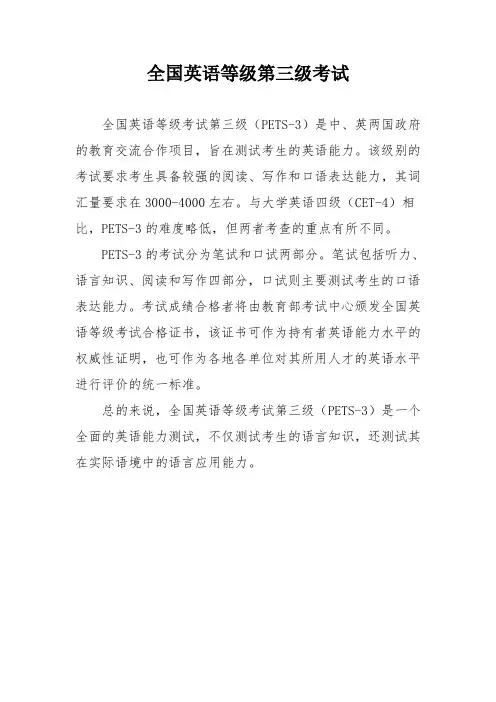
全国英语等级第三级考试
全国英语等级考试第三级(PETS-3)是中、英两国政府的教育交流合作项目,旨在测试考生的英语能力。
该级别的考试要求考生具备较强的阅读、写作和口语表达能力,其词汇量要求在3000-4000左右。
与大学英语四级(CET-4)相比,PETS-3的难度略低,但两者考查的重点有所不同。
PETS-3的考试分为笔试和口试两部分。
笔试包括听力、语言知识、阅读和写作四部分,口试则主要测试考生的口语表达能力。
考试成绩合格者将由教育部考试中心颁发全国英语等级考试合格证书,该证书可作为持有者英语能力水平的权威性证明,也可作为各地各单位对其所用人才的英语水平进行评价的统一标准。
总的来说,全国英语等级考试第三级(PETS-3)是一个全面的英语能力测试,不仅测试考生的语言知识,还测试其在实际语境中的语言应用能力。
Section I: Listening ComprehensionThis section is designed to test your ability to understand spoken English. You will hear a selection of recorded materials and you must answer the questions that accompany them. There are two parts in this section, Part A and Part B. Remember, while you are doing the test, you should answer the questions in your test booklet, NOT on the ANSWER SHEET. At the end of the listening comprehension section, you will have 3 minutes to transfer your answers from your test booklet onto your ANSWER SHEET1. If you have any questions, you may raise your hand NOW as you will not be allowed to speak once the test is started.Now look at Part A in your test booklet Part A:You will hear 10 short dialogues. For each dialogue, there is one question and four possible answers. Choose the correct answer A, B, C or D, and mark it in your test booklet. You will have 15 seconds to answer the question and you will hear each dialogue ONLY ONCE. Example:You will hear:W: Could you please tell me if the Beijing flight will be arriving on time?M: Yes, Madam. It should be arriving in about ten minutes.You will read:Who do you think the woman is talking to?[A] a bus conductor[B] a clerk at the airport[C] a taxi driver[D] a clerk at the station From the dialogue, we know that only a clerk at the airport is most likely to know the arrival time of a flight, so you should choose answer [B] and mark it in your test booklet.Sample Answer[A] [■] [C] [D] 1. M: That's a nice dress you're wearing.W: Thank you. My father gave it to me as a birthday present. He knows red's myfavourite colour. 1. What are they talking about? [A] their best friend[B] their favourite colour[C] the clothes the woman is wearing[D] a present the man has bought 2. W: Mike, there's not much left in the refrigerator.M: Well, I might be able to pick up a few things after work, but I have to be back rather late today.W: In that case, we'll make do with a meal out at McDonald's.M: OK. See you there at 8:00. 2. What do they decide to do? [A] The man will bring some food back for dinner.[B] They will go to their friend's home for supper.[C] The woman will fill the refrigerator before supper.[D] They will eat out for dinner. Part B:You are going to hear four conversations. Before listening to each conversation, you will have 5 seconds to read each of the questions which accompany it. After listening, you will 15 seconds to answer each question by choosing A, B, C or D. You will hear each conversation ONLY ONCE. Mark your answers in your test booklet. Questions 1 to 4 are based on a talk by a speaker about his hobbies. W: Well, Mr. Smith, we have had an interesting discussion about your work. Now, tell us something about your after work activities. M: I guess not much different from everyone else. I'm interested in sport, and I run about 3 miles every day. I particularly enjoy cross-country running, where you have to run across fields, jump over streams and so on. While I'm running I think about all sorts of things, and at the end of a run I'm sometimes surprised to find that I've managed to solve a problem that was on my mind. Next year I'm going to try the London Marathon. It's a long, hard race-26 miles, or 42 kilometers-and you have to be tough to finish, but I very much want to do it. I worry a bit about getting old, and I'd like to prove to myself that I'm still almost as fit as I was twenty years ago. I 'm interested in climbing as well as running. I'll never become an expert climber, but I know what I'm doing in the mountains. I successfully completed a course in snow and ice climbing when I was younger, and I've done a series of easy climbs in the Alps during the last few years. My wife doesn't share my interest in Mountains. She agreed to go climbing with me once, but she found that she fel(更多外语考试资讯尽在)t ill as soon as she got above 1,000 meters, so we decide to follow different hobbies. W: You certainly seem to enjoy various types of recreation. All right, Mr. Smith. Thanks for your interesting talk. 1. What are the man's hobbies? [A] running and thinking [B] running and jumping[C] running and climbing [D] running and skiing 2. What is the main reason that the man runs every day? [A] to think out some difficult problems[B] to do some cross-country running[C] to finish a course in physical training[D] to keep fit and healthy 3. What is the man going to do next year? [A] enter for the London Marathon[B] do a cross-country running[C] climb the Alps with his wife[D] complete a course in snow and ice climbing 4. What is the speaker's main topic? [A] training for a professional athlete[B] his ways of physical training[C] how to do cross country running[D] how to do mountain climbing Section II Use of EnglishRead the following text. Choose the best word or phrase for each numbered blank andmark A, B, C, or D on your ANSWER SHEET 1. TextIn Britain, winter is the season not only for visits to the theatre, opera, concerts and ballet, but also for shopping or for sightseeing.London, one of the __1__ cities in the world, has plenty to offer during the winter months, __2__ in the way of entertainment - and the __3__ act like a magnet with __4__ array of presents for the Christmas __5__, followed by large scale bargains in the January __6__. But it's not only London that __7__ value shopping - most of our suburban and __8__centres have just as much to offer to the __9__ shopper.Even if you're based __10__ London, you don't have to spend all your __11__ there - and that goes for all the year __12__, too. Take a train or coach and __13__ what else Britain has to offer; __14__ are many excursions, even in winter, and among the great country houses __15_ keep their stately front doors open __16__ the year are Longleat and Woburn Abbey. __17__ a car and drive __18__ into the beauty of the winter landscape - the scenery will be __19__ beautiful - and the people will have more time to chat to you __20__ this time of year. 1. [A]coldest [B]foggiest [C]busiest [D]noisiest 2. [A]normally [B]especially[C]occasionally[D]generally 3. [A]clubs [B]pubs [C]restaurants [D]shops 4. [A]its [B]the [C]that [D]their 5. [A]shopper [B]visitor [C]caller [D]spender 6. [A]bargains [B]sales [C]selling [D]trading 7. [A]opens [B]presents [C]grants [D]offers 8. [A]provincial[B]national [C]divisional [D]international 9. [A]lonely [B]eager [C]lazy [D]nervous 10.[A]in [B]at [C]on [D]outside 11.[A]money [B]time [C]energy [D]holiday 12.[A]there [B]then [C]over [D]round 13.[A]see [B]watch [C]look [D]view 14.[A]they [B]which [C]there [D]here 15.[A]where [B]which [C]what [D]who 16.[A]for [B]by [C]within [D]throughout 17.[A]Lend [B]Let [C]Hire [D]Take 18.[A]out [B]back [C]on [D]across 19.[A]even [B]still [C]yet [D]ever 20.[A]after [B]beyond [C]with [D]at Section III Reading ComprehensionPart ARead the following three texts. Answer the questions on each text by choosing A, B, C or D. Mark your answer on the ANSWER SHEET 1 by drawing a thick line across the corresponding letter in the brackets. Text It was a quarter past nine as Marie hurried into the office building where she was going to work. Her bus had inched along through heavy morning traffic, making her a few minutes late for her very first job. She decided to start out half an hour earlier the next day.Once inside the lobby, she had to stand at the elevators and wait several minutes before she could get on one going to the sixth floor. When she finally reached the office marked "King Enterprises," she knocked at the door nervously and waited. There was no answer. She tapped on the door again, but sti。
公共英语三级英语教材lesson 1Kip KeinoKipchoge Keino is a modest man,and it takes prodding to get the great Kenyan runner to recall how he felt on Oct ,20,1968 — when he won his first gold medal,in the 1,500 meters in Mexico City.The day hadn't started out well,Keino was suffering from stomach pains that later turned out to be a severe gallbladder infection. His doctors advised against running;he ignored them.During the race,Keino was so focused on competing against American ace Jim Ryun that,in retrospect,“Without watching a video, I wouldn't know what happened at the finish.” He does remember what happened next. “I ran an honor lap. I ran it to celebrate and to let my body recover. I felt overcome by the excitement.” It was not the only memorable event in his life that day. Back home, his wife, Phyllis, gave birth to their third daughter, named Milka Olympia Chelagat in celebration of her father's victory.Keino went on to win a silver medal in the 5,000 meters in Mexico City and a gold and a silver four years later in Munich. He then became Kenya's Olympic running coach from 1976 to 1986, furthering his nation's dominance in distance events. Kenyan runners have captured 32 Olympic track medals since 1964 and won the last six consecutive Boston Marathons. This summer, Keino will be in Atlanta as chief of the 120-athlete Kenyan delegation, which could include his son Martin, 23, a former NCAA 5,000-meter champion at the 1,5000 meters.But Keio's athletic accomplishments are not the only reason he is a hero in the town of Eldoret in northwestern Kenya. Thirty years ago, Keino and his wife—who now have seven children of their own—began taking orphans into their home. Their house became so crowded that they raised funds to build a dormitory and a dining hall on a nearby farm Keino owns. Income to support the facility comes from the farm, his sports shop and fees he has received from the Kenyan government over the years. Today, 73 children and young adults—aged 2 to 22—live on the farm. “I think I have been lucky,” Keino says. “Now what is important is how I use what I have to help others.”Lesson 1Kip Keino克普乔格·凯诺是一个很谦虚的人,要使这位伟大的肯尼亚长跑运动员回想起他在1968年10月20日那一天的感受不是一件很容易的事情——(当天他)在墨西哥城参加1500米长跑比赛中赢得了一生中的第一枚金牌。
全国英语等级考试(PETS)是全国性的英语考试,面向全体公民(除义务教育阶段学生外),主要测试考生的英语交际能力,不涉及学历审查。
其中,公共英语三级(PETS Level3)是PETS考试中的一个级别。
公共英语三级考试主要包含笔试和口试两部分,笔试部分包括听力、选词填空、阅读、写作等内容。
对于报名参加公共英语三级考试的考生,需要提供身份证原件扫描件及复印件2张,免冠蓝底电子照片一份及2寸照片2张。
报名全国英语等级考试(PETS)的过程中,考生可以在承办机构的网站上完成报名,并且可以在线查询考试成绩。
具体的考试时间和地点等信息会在考试临近时公布。